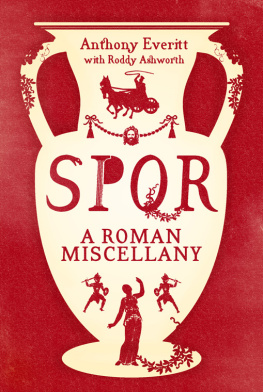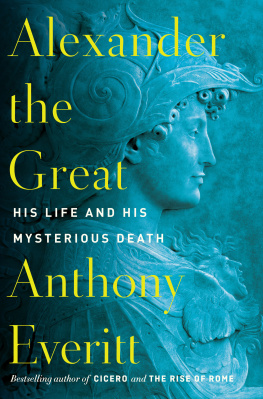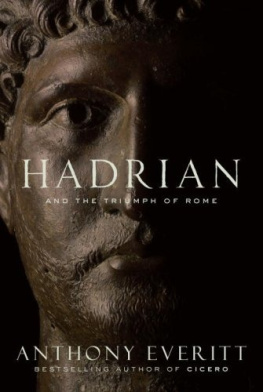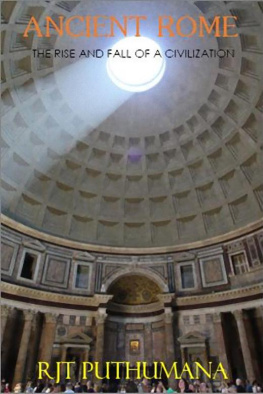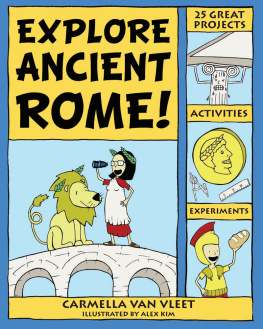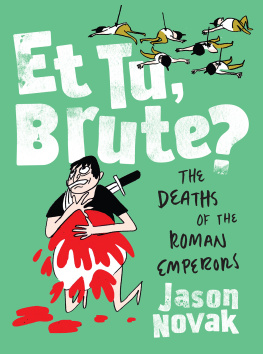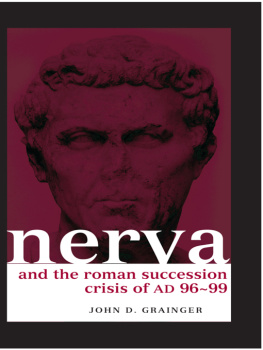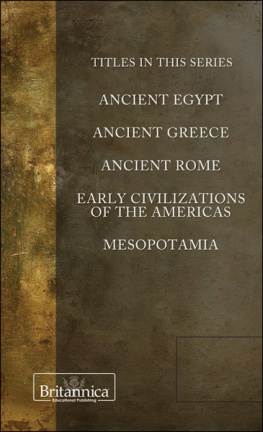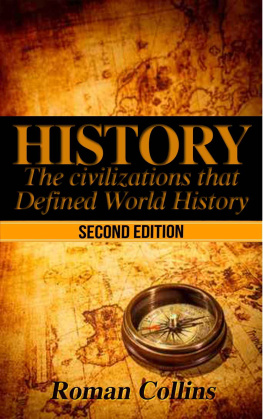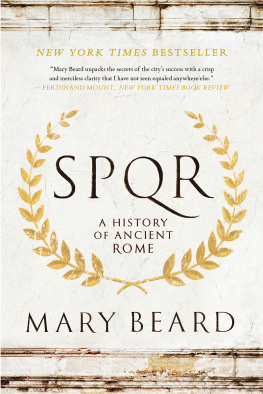


www.headofzeus.com

Contents

R OME CREATED ONE OF THE LARGEST EMPIRES IN WORLD HISTORY . In its heyday, under the emperor Trajan in the second century AD , it governed up to 60 million people in an area of about 5 million square kilometres. It stretched from Spain to Turkey, from the Black Sea to the Maghreb, over what are now more than forty modern countries. Even so, in population and extent the Roman empire was easily surpassed by othersamong them, the empires conquered by the British, the Mongols, the Russians, the Muslim Caliphs and the Spanish.
Where Rome wins out is in staying power. Its empire lasted as a single entity for more than 500 years, and its eastern half survived another millennium until the fifteenth century AD , when Muslim invaders brought it down. How did it manage this feat? The Romans were the most aggressive of people, and as they built their power, hardly a year passed when they were not at war with somebody. They acquired most of the then known world through conquest.
One would have thought this would have aroused resentment against their rule. But, having beaten up their victims, Romans shook them by the hand and invited them to join them as partners
Also, the Romans governed those who agreed to be governed with a light, decentralized touch. As a result they brought peace and prosperity. Although Roman officials tended to be arrogant and patronizing, it was in everybodys interest to maintain the status quo. Even the barbarian invaders who eventually destroyed the empire did not do it on purpose. They wanted to join it rather than destroy it.
The consequence of longevity was that Roman institutions and assumptions sank deep into Europes psyche. Roman law profoundly influenced the legal systems of the West. In architecture and town-planning the language of pediments and pillars, arches and vaults, survived into the twentieth century; the characteristic spaces and places in Roman towns that were open to allthe square, the temple, the racetrack and the bathsbecame the foundation of the modern democratic city. For better or for worse, the entente between church and state launched Christianity on its way to becoming one of the worlds great religions. Romes forms of constitutional government influenced legislators in Europe and the United States.
Latin has not been a living language since its transformation into modern tongues such as Italian and Spanish, but it has cast a long shadow forward. The Roman Catholic Church conducted its services in Latin until the 1960s. Plants, stars, constellations and anatomical terms are also still catalogued in Latin.
But what were the Romans actually like? In these pages I give a flavour of their world. Here are stories that arent usually told: stories that are interesting, instructive, funnyand sometimes disgusting. Incidents of daily life rub shoulders with great events, fine-dining recipes with barbarian invasions. I profile great men and women, criminals and eccentrics. Also, I correct inaccurate clichs about the Romans and how they lived. Non-Roman voices make themselves heard too, for people of many different nationalities inhabited an empire which they felt belonged to them just as much as it did to its founders.
Despite its distance from us, we can still see aspects of the Roman way of life mirrored in our own. The crowded and noisy amenities of urban life, the states cultivation of high culture, the brutal excitements of mass entertainment, sports celebrities, a rising divorce rate, seaside resorts and second homes in the country, the miseries of civil war, the misdemeanours of the young, political dinner parties, fast-food bars, economic globalization (at least within the empires boundaries), disastrous wars in what is now Iraqall these, among many other things, have their modern resonance. The basic message is that while social landscapes differ markedly on the surface, the deep core of human nature changes little over time.
I make no claim to be comprehensive; this is simply a personal selection of items that have caught my eye. There is plenty that has been left out. But I hope that, taken altogether, this anthology will sketch a portrait, warts and all, of the originators of our Western civilization.

The Jews were an exception and their two uprisings were put down with maximum force and cruelty.
).

FOUNDATIONS
[]
ROMES FABULOUS FOUNDATION
T HE ROMAN STATE was founded on a fiction: a legend that forged a link between Rome and Troy, the famous and once powerful city on the coast of Asia Minor. The complicated story told how a Trojan prince, Aeneas, accompanied by his young son and aged father, escaped from the smoking ruins of Troy, which had finally been destroyed by the Greeks after ten years of fighting. He then sailed around the Mediterranean with a group of survivors looking for somewhere to establish a new city. Finally he settled in Italy, and from him sprang the Roman nation.
The link between Troy and the Romans was largely invented by Greek historians, who liked to bring interesting up-and-coming foreign powers within their net. The fullest version of Aeneas escape from Troy and his subsequent adventures can be found in Virgils national epic, the Aeneid .
For their part, the Romans were flattered by the attention. They suffered from a pronounced inferiority complex vis--vis Greece. They were not at all impressed by latter-day Greeks, whom they had invaded and annexed in the second century BC . They regarded them as decadent and incompetent, the cheese-eating surrender monkeys of their day. But they were lost in admiration for the classical Hellenic pastthe architecture of Ictinus, the tragedies of Aeschylus, Sophocles and Euripides, the philosophy of Socrates, Plato and Aristotle, the sculpture of Pheidias. There was nothing in Roman culture that could compare. Even when in due time Rome produced its own stock of geniuses, such as the poets Virgil and Horace, they tended to imitate Greek originals.
In the second century AD the emperor Hadrian did his best to reinvigorate Hellenic culture and presented it as an essential ingredient of Romes imperial ideology. When Rome itself was sacked and the western empire collapsed at the end of the fifth century AD , the eastern half, governed from Constantinople, remained in place for another 1,000 years. Its official language, its lingua franca , was Greek, and although its people called themselves Romans, they used the Greek word Romaioi .
[]
THE RELUCTANT HERO
Dido, bereft, then kills herself, thereby giving cause for the subsequent visceral hatred between Rome and Carthage.
After leaving Carthage, Aeneas settled in Latium. His son Ascanius founded the city of Alba Longa, and from him descended a long line of kings as fictional as he was. These culminated in the father of the twins Romulus and Remus, who left Alba Longa to found Rome.
Next page
